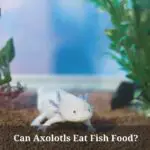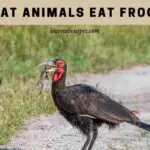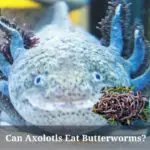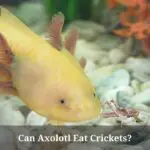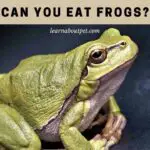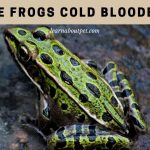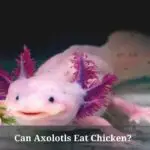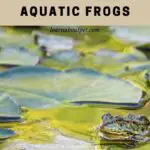Having an exotic pet like Axolotl who has lived in a little population is a big responsibility. Axolotl must be considered fully in terms of water requirements and also their diet.
Axolotl’s primary diet is meat. They need diet protein because they are in their digestive system. Determining what food is excellent for their health will prolong their life. Worms are the proper daily food for Axolotl.
Can Axolotls eat angleworms? Axolotls are known to eat worms, including angleworms. Find angleworms that fit in the Axolotl’s mouth. Angleworms are rich in protein and other essential nutrients for Axolotl’s health. You can buy a lot of angleworms in the pet store, making it time and cost-effective for Axolotl.
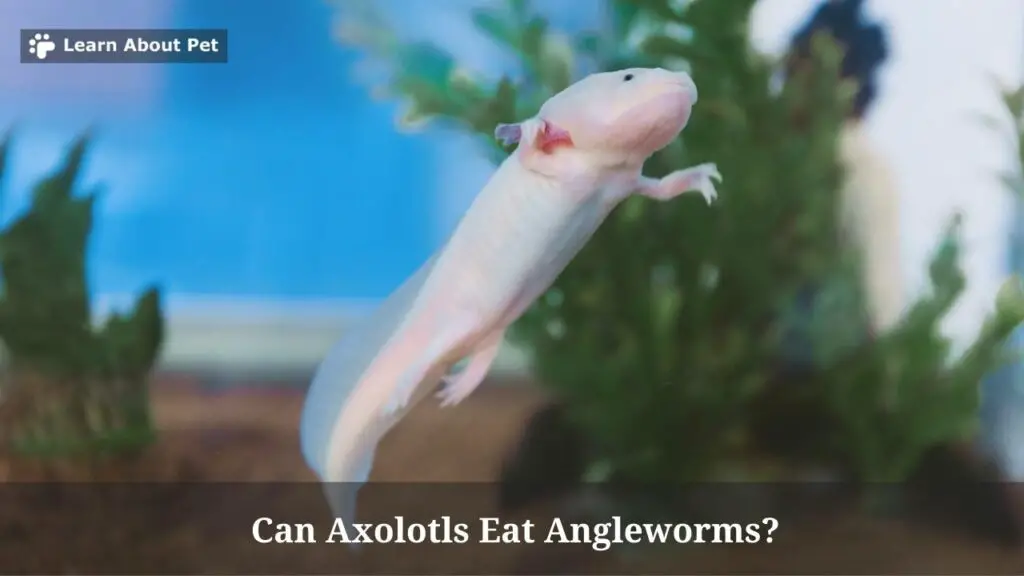
Although many other types of worms can be eaten by Axolotl, this time we discuss angleworms. Let’s read this article to the end.
Can Axolotl Eat Angleworms?
Axolotl can eat angleworms if their size is fit in Axolotl’s mouth. Axolotl could not tear the food into small pieces because Axolotl’s teeth were small and not sharp.
If the size of the angleworms is too large when the condition is intact, you need to cut it per bite size and point the angleworm’s body part to Axolotl’s mouth.
How Much Angleworms Can You Feed Axolotls?
You should see the Axolotl eating schedule according to their life stage. For example, an adult Axolotl only needs to eat every 2-3 days because their digestive system is not like a baby Axolotls who requires eating twice a day.
You can give health risks to adult Axolotl if you force giving angleworms every day.
For various Axolotl nutritional needs, replace several types of worms or other foods such as insects, crustaceans, or small fish.
Feeding Axolotl can be with a few different menus so that your pet can recognize other flavors and be an alternative if their primary food runs out and cannot be obtained shortly.
How Often To Feed Angleworms To Axolotls?
Live worms are one of the best foods for Axolotl. But small angleworms and cut it into small pieces adjust to Axolotl’s mouth. Feed the Axolotl twice a day (for baby – juvenile Axolotl).
Give a few pieces of worms until Axolotl rejects them.
Axolotl can continue to eat until they reject it to ensure Axolotl is well fed. Axolotl who eat less will be easily stressed and act aggressively. If Axolotl has a tank mate and they don’t get enough food, then Axolotl can be aggressive.
Do Axolotls Get Impaction From Angleworms?
Axolotl can be affected by impactions for several things. One of the causes of impact is overfeeding. Axolotl will eat anything in front of them.
If you exceed the capacity to feed Axolotl, they can be too full, and their digestive system cannot process food too fast because other foods enter.
It not only applies to angleworms, but all types of food you give to Axolotl. To avoid impaction below is a healthy Axolotl eating schedule.
| Axolotl life stage | Axolotl size | How much to eat |
| Hatchling | Under 1” | 2x per day |
| Baby | 1.5-3” | 2x per day |
| Juvenile | 3-5” | 1x per day |
| Subadult | 6-8” | Every other day |
| Adult | Over 8” | Every 2-3 days |
Can Axolotl Eat Dry Angleworms?
Soft angleworms are recommended for Axolotl. A dry angleworm will create problems in the Axolotl’s digestive system. Young Axolotl has no desire to eat dry food and is more interested in live foods. Try to give some dry angleworms. If Axolotl rejects it, then replace it with live angleworms.
Can Axolotls eat angleworms? Yes, but don’t serve dry angleworms. Try to give in another form to avoid Axolotl Health Issues.
Can Axolotls Eat Live Angleworms?
Yes, it’s safe to feed Axolotl with live angleworms. Ensure to cut several parts of the worms until enough with the size of the Axolotl mouth. Feed the worms moderately, and replace them with other menus to provide variations to Axolotl’s diet.
With too much-providing angleworms, there is a risk of impacting or overfeeding. If Axolotl only gets the same type of food, we don’t know what nutrients or protein for Axolotl, and your pet cannot get their prime conditions.
Can Axolotl Eat Frozen Angleworms?
Frozen angleworms are not visibly appealing for Axolotl. Imagine your pet eats worms with a hard texture that can damage their teeth. Axolotl can’t chew their food, but only grasp and swallow it as a whole. If frozen angleworms remain in solid form, your Axolotl might not enjoy it.
Can Axolotls eat angleworms? Axolotls will eat whatever the owners give them. Axolotls prefer to eat live foods over any foods in frozen form.
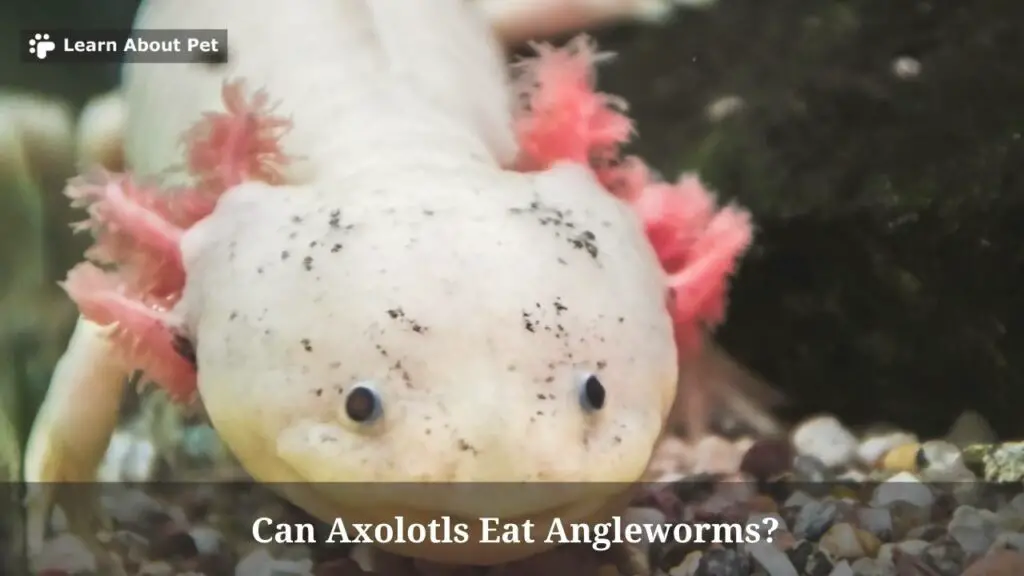
Can Axolotls Eat Freeze Dried Angleworms?
Dried angleworms are not suitable food for Axolotl because they can hurt the axolotl’s digestive system. Ensure you only give a piece of live angleworms and do not give in other forms.
Freezing food is never suitable for Axolotl because they prefer live foods.
Can Baby Axolotls Eat Angleworms?
Baby axolotls can only eat soft food in small sizes. Only give soft angleworms occasionally to keep the baby axolotl’s health. Ask your vet what foods are excellent for the development of baby axolotls.
The diet of baby axolotls is more than that of subadult or adult axolotls. Feed baby Axolotls 2 times per day for their maximum growth.
Foods that are suitable for baby axolotls are baby brine shrimp, crickets, and insects. Giving angleworms can risk causing impaction because the size of the worms is too large for the baby axolotl’s mouth.
Do Axolotls Eat Angleworms In The Wild?
Axolotls eat anything that moves in front of them. If Axolotls find angleworms in the wild, they may become their prey.
All the meat type that is enough in the Axolotl’s mouth will become their meal because the Axolotl is a predator.
Axolotls are not picky eaters. They can eat whatever they want in the wild, even smaller fish.
Now you will find it challenging to monitor the movement of axolotls in the wild because the population in their natural environment has decreased drastically.
What Are The Health Risks Of Eating Angleworms?
There are no health risks that Axolotl will get when you give it in moderation. Give it according to their feeding schedule so that Axolotl’s digestive system is not burdened.
There is a possibility that impaction will only occur if the Axolotl overeats or eats the hard substrate under the tank.
Angleworms are foods that provide a lot of beneficial health to the Axolotl and what nutrients the axolotl needs.
How To Prevent Axolotls From Eating Angleworms Excessively?
Axolotl in captivity will not eat something excessively without any help from its owner. You have to understand the right portion for Axolotl. Give them small pieces of worms until they reject them.
Don’t give the Axolotl another angleworm until it’s time for the next meal. Axolotls can eat every day, but it can make them obese or impaction. You can give a special schedule to give angleworms once a month or once in a while.
Do not force the Axolotl to eat one type of food during its lifetime because our pet also needs a variety of food, protein, and nutrition.
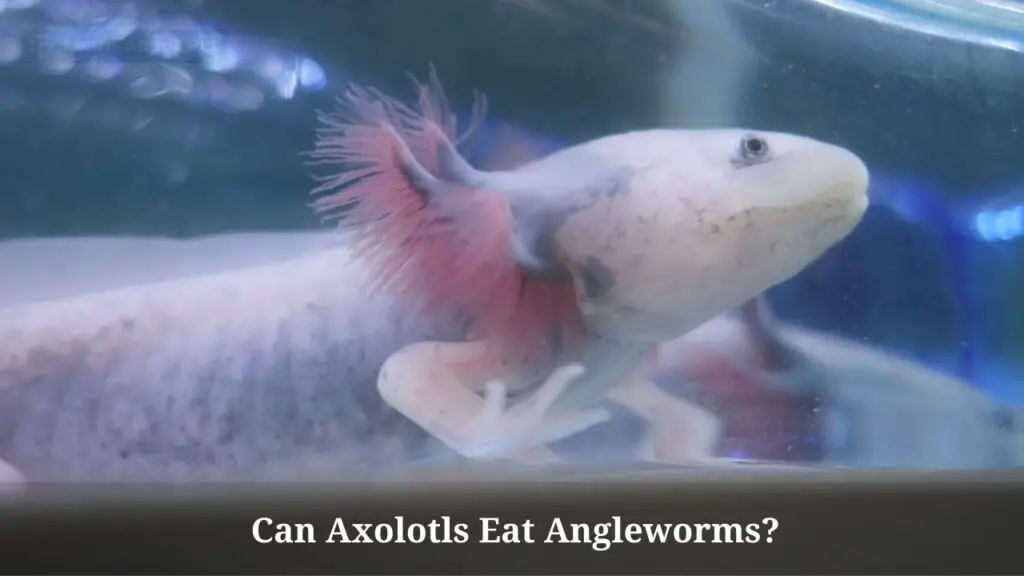
Final Verdict – Can Axolotls Eat Angleworms
Axolotl is known to eat larvae or worms in the wild, and angleworms can also be a regular food to meet Axolotl’s needs.
You can give angleworms according to the size of the Axolotl’s mouth, and give it in moderation. Give Axolotl a chance to get other proteins for variety in taste and also Axolotl’s nutritional needs.
As a pet lover, make sure to learn about pet more and give your pet axolotl a good and comfortable life!

Welcome to Learn About Pet. My name is Rajkumar Ravichandran and I love all pets, travel, and amazing food. I write about my passion and personal experience caring for multiple pets in this blog! ❤️
Post Disclaimer
DISCLAIMER: THIS BLOG OR WEBSITE, "Learn About Pet", DOES NOT PROVIDE YOU WITH MEDICAL ADVICE AND IS NOT A SUBSTITUTE FOR MEDICAL ADVICE. ALWAYS GET IN TOUCH WITH YOUR PERSONAL VETERINARIAN AND USE INFORMATION HERE AS GENERAL ADVICE.
The information, including but not limited to, text, graphics, images and other material contained on this website are for informational purposes only. No material on this site is intended to be a substitute for professional veterinary advice, food recommendation, diagnosis, or treatment. Always seek the advice of your veterinarian or other qualified health care provider with any questions you may have regarding a medical condition or for pet food related questions.
